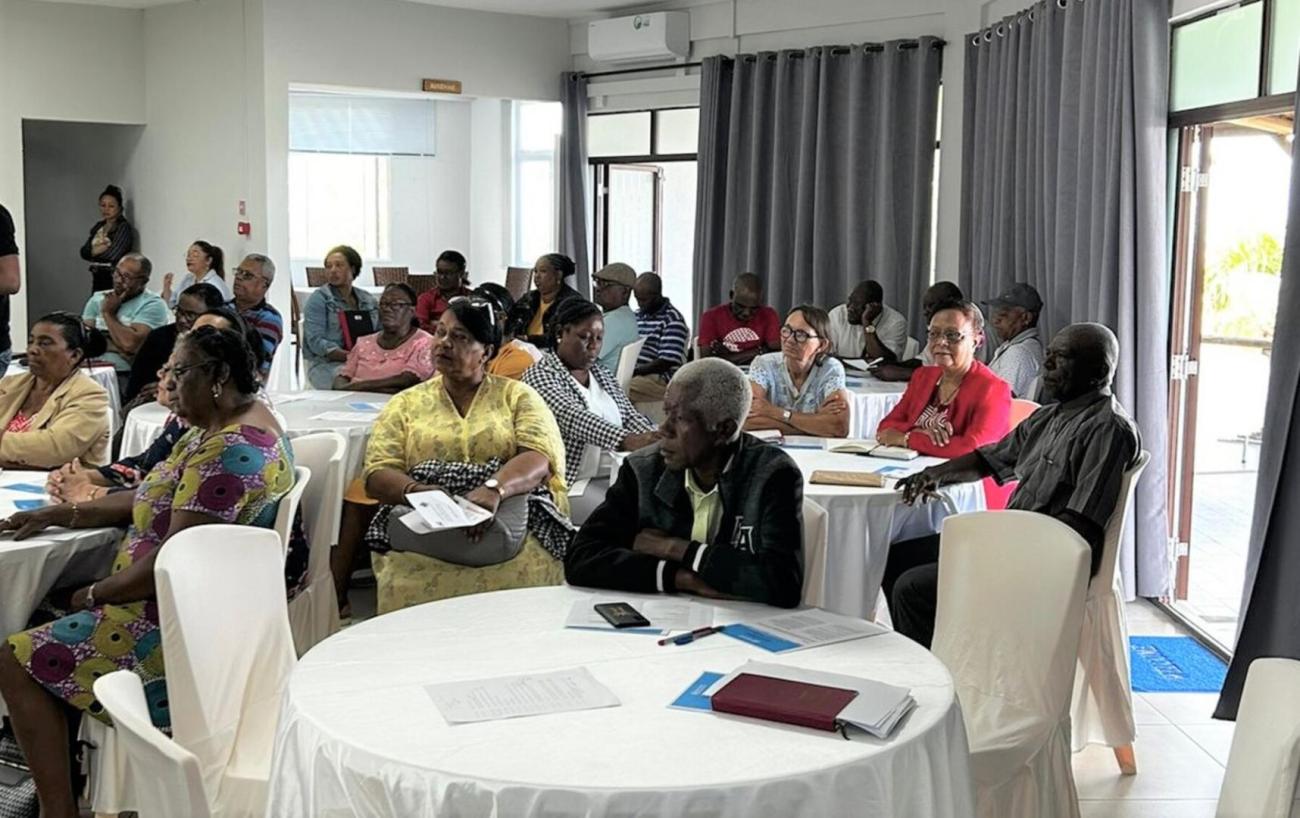A sensitization campaign and training-of-trainers (ToT) was conducted in Rodrigues during September as part of the National Integrated Care for Older People (ICOPE) Strategy, which promotes an integrated and person-centred approach to caring for older persons. Bringing together over 80 carers, social workers, nurses and doctors, as well as representatives of senior citizens associations and various commissions, the three-day event was a welcome exercise in knowledge sharing for this island of around 44,000 people of which those over the age of 65 has risen from 7.5% to 9.1% between 2011 and 2021. Of particular interest to the participants was the dissemination of the ICOPE Strategy and screening techniques for the early detection and prevention of physical and cognitive impairments.
In her opening address in Rodrigues, the WHO Representative, Dr Anne Ancia, stated that ICOPE provides “a clear path forward for enhancing care for older persons through community engagement, workforce development, and legislative improvements. It represents a commitment to adapting health systems to better meet the needs of an aging population." She highlighted:
"Proactively adapting our health and social service delivery systems today in order to address the specific needs of older people in an integrated manner will enable people to live longer and healthier without overburdening the health sector or the country’s economy.”
The need to build the capacity of health and social workers at primary healthcare level is highlighted by the fact that the share of the total Mauritian population aged 60 years or above is projected to increase from 18.7% in 2021 to 36.5% in 2061 (the country’s older population is also getting progressively older). Over 400 doctors, nurses, social workers, psychologists and dieticians have been trained on ICOPE since it was rolled out, and they continue to cascade their training to their fellow public health professionals as part of its community-based approach.
An important component of ICOPE is the early, systematic screening of physical and cognitive decline so that these impairments can be detected at an early stage, when they can still be addressed effectively and before they lead to complications or to the loss of people autonomy. In May 2024, WHO and the Ministry of Health and Wellness (MOHW) conducted a pilot for the systematic screening of 1,000 older persons to understand the need for referrals to higher health services (5 to 10% of persons screened required a higher level of care) and to plan for the expansion of these services accordingly.
The ICOPE Focal Point for Rodrigues, Dr Davidson Casimir, explains that sensitization campaign and ToT, which were conducted by the MOHW and WHO Mauritius, served to “train trainers in Rodrigues on how to detect certain health problems affecting the elderly. As we saw, one doesn’t necessarily need to be a doctor to do this. In practice, it’s a tool that allows us detect problems related to eyesight, hearing, mobility, depression and cognitive decline, such as Alzheimer’s, using simple questions and observations.”
Felicité Esther Roussety of the Ministry of Social Integration, Social Security and National Solidarity is equally enthused by the training on early screening. “It will allow people to look out for the warning signs without necessarily having to come to a healthcare facility. This can help improve quality of life whilst also reducing the burden on public finances,” she notes. “We can’t eliminate all health issues, but we can at least give a chance to elderly people to age well. It’s good to see that Rodrigues is included in the ICOPE strategy. I’m confident that the healthcare workers who’ve followed this training will be better equipped to provide quality health care to our elderly people.”
Everyone has the right to age in safety and with dignity. WHO Mauritius through the development and implementation of ICOPE is supporting the United Nations promise to Leave No One Behind on the road to sustainable development.
*********************************************************************************************
Edited extract from the original article first published on the WHO Regional Office for Africa website on 09 October 2024.



